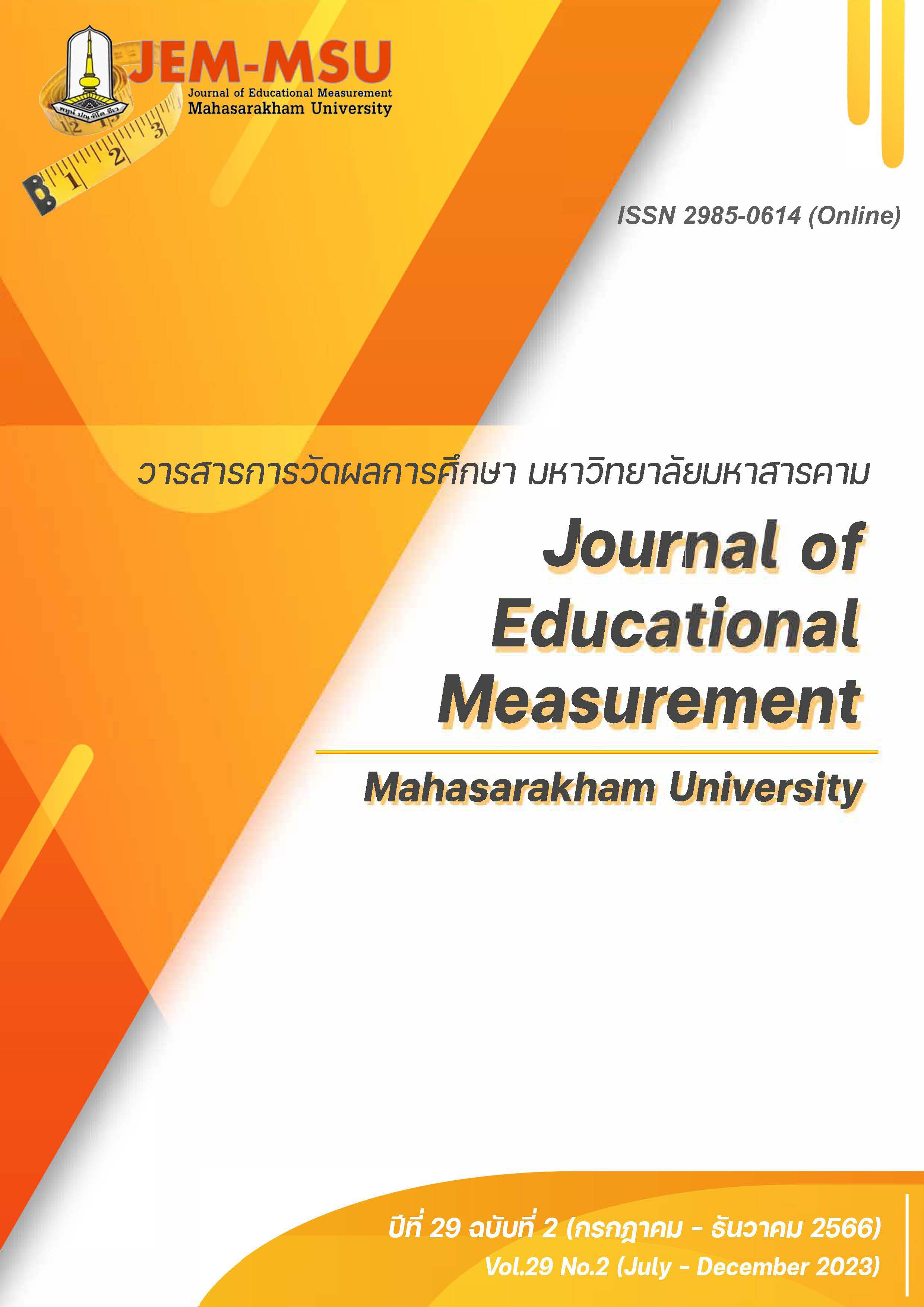แนวทางการวัดและประเมินผลเพื่อส่งเสริมความยึดมั่นผูกพันกับองค์กรของพนักงาน
Main Article Content
บทคัดย่อ
ความยึดมั่นผูกพันกับองค์กรเป็นทัศนคติของบุคลากรในองค์กรที่แสดงออกถึงความคิด ความรู้สึก การรับรู้ และการเรียนรู้เกี่ยวกับงานหรือองค์กร ซึ่งนำมาสู่ความสัมพันธ์และความพึงพอใจของบุคลากรที่มีต่อองค์กรของตน ทฤษฎีที่เกี่ยวข้องกับความยึดมั่นผูกพันกับองค์กรเป็นทฤษฎีเชิงจิตวิทยาและพฤติกรรมศาสตร์ ที่อธิบายถึงการก่อให้เกิดพฤติกรรมของมนุษย์ ตลอดจนแรงจูงใจที่ก่อให้เกิดพฤติกรรมนั้น ๆ ประกอบด้วย กลุ่มทฤษฎีเชิงเนื้อหา กลุ่มทฤษฎีเชิงกระบวนการ และกลุ่มทฤษฎีการเสริมแรง ดังนั้น การส่งเสริมความยึดมั่นผูกพันกับองค์กรของพนักงานจึงต้องอาศัยข้อมูลการวัดความยึดมั่นผูกพันกับองค์กร ซึ่งสามารถวัดได้จากปัจจัยที่ส่งผลต่อความยึดมั่นผูกพันกับองค์กรของพนักงาน ประกอบด้วย วิสัยทัศน์และแนวนโยบายการบริหารที่มีความชัดเจน เป้าหมายขององค์กรที่มั่นคงและสร้างการมีส่วนร่วมของพนักงาน ค่าตอบแทนและสวัสดิการที่เหมาะสมเพื่อสร้างแจงจูงใจในการทำงาน การจัดการด้านสิ่งแวดล้อมหรือบรรยากาศการทำงานที่มีความสะดวกสบาย การสร้างความมั่นคงและโอกาสก้าวหน้าในอาชีพเพื่อให้พนักงานเกิดความรู้สึกท้าทายและกระตือรือร้นในการทำงานให้สำเร็จ การสื่อสารภายในองค์กรที่สร้างความเข้าใจแก่พนักงานให้ไปในทิศทางเดียวกันเพื่อลดการขัดแย้ง และความยืดหยุ่นในการทำงาน ตลอดจนการยอมรับฟังความคิดเห็นของพนักงานในทุกระดับ พร้อมทั้งการปรับเปลี่ยนแนวทางการทำงานไปตามสถานการณ์เพื่อลดความตึงเครียดและความกดดันในการทำงานของพนักงาน
Article Details

อนุญาตภายใต้เงื่อนไข Creative Commons Attribution-NonCommercial-NoDerivatives 4.0 International License.
เนื้อหาและข้อมูลในบทความที่ลงตีพิมพ์ในวารสารการวัดผลการศึกษา มหาวิทยาลัยมหาสารคาม ถือเป็นข้อคิดเห็นและความรับผิดชอบของผู้เขียนบทความโดยตรง ซึ่งกองบรรณาธิการวารสาร ไม่จำเป็นต้องเห็นด้วย หรือร่วมรับผิดชอบใดๆ
บทความ ข้อมูล เนื้อหา รูปภาพ ฯลฯ ที่ได้รับการตีพิมพ์ในวารสารการวัดผลการศึกษา มหาวิทยาลัยมหาสารคาม ถือเป็นลิขสิทธิ์ของวารสารการวัดผลการศึกษา มหาวิทยาลัยมหาสารคาม หากบุคคลหรือหน่วยงานใดต้องการนำทั้งหมดหรือส่วนใดส่วนหนึ่งไปเผยแพร่ต่อหรือกระทำการใดๆ จะต้องได้รับอนุญาตเป็นลายลักษณ์อักษรจากวารสารการวัดผลการศึกษา มหาวิทยาลัยมหาสารคาม ก่อนเท่านั้น
เอกสารอ้างอิง
Adams, J.S. (1965). Inequity in Social Exchange. Advances in Experimental Social Psychology, 2, 267-299.
Alderfer, C.P. (1972). Existence, relatedness, and growth: Human needs in organizational settings. Free Press.
Bora, L. (2023). Inclusion leadership and employee work engagement: The role of organizational commitment in Cambodian public organization. Asia Pacific Management Review. 29(1), 44-52. https://doi.org/10.1016/j.apmrv.2023.06.003
Herzberg, F. (1959). The motivation to work. John Wiley & Sons publisher.
Horvathova, P., Mikusova, M., & Kashi, K. (2019). Evaluation of the employees’ engagement factors importance methodology including generation Y. Economic Research-Ekonomksk Istrazivanja, 32(1), 3895-3917.
Jones, G.R., George, J.M., & Hill, C.W.L. (2000). Contemporary Management (2nd ed.). McGraw-Hill Education.
Kahn, W.A. (1990). Psychological conditions of personal engagement and disengagement at work. Academy of Management Journal, 33(4), 692–724. https://doi.org/10.2307/256287
King, M., & Bruner, G. (2000). Social desirability bias: a neglected aspect of validity testing. Psychology and Marketing, 17(2), 79-103.
Madhura, B., & Deepika, P. (2014). A study on the drivers of employee engagement impacting employee performance. Procedia - Social and Behavioral Sciences, 133, 106-115.
Maslow, A.H. (1954). Motivation and personality. Harper.
Masterson, S.S., Lewis, K., Goldman, B.M., & Taylor, M.S. (2000). Integrating justice and social exchange: The differing effects of fair procedures and treatment on work relationship. Academy of management journal, 43(4), 738-748.
Meyer, J.P., & Allen, N.J. (1997). Commitment in the Workplace. California, Sage Publications.
Mowday, R.T., Porter, L.W., & Steers, R.M. (1982). Employee Organization, Linkages: The Psychology of Commitment Absenteeism and Turnover. Academic Press.
Pukkeeree, P., Na-Nan, K., & Wongsuwan, N. (2020). Effect of Attainment Value and Positive Thinking as Moderators of Employee Engagement and Innovative Work Behaviour. Journal of Open Innovation: Technology, Market, and Complexity, 6(3), 69. https://doi.org/10.3390/joitmc6030069
Rameshkumar, M. (2020). Employee engagement as an antecedent of organizational commitment – A study on Indian seafaring officers. The Asian Journal of Shipping and Logistics, 36, 105-112.
Saks, A. M. (2006). Antecedents and consequences of employee engagement. Journal of Managerial Psychology, 21(7), 600–19.
Schaufeli, W.B., Bakker, A.B., & Salanova, M. (2006). The measurement of work engagement with a short questionnaire: A cross-national study. Educational and Psychological Measurement, 66, 701-716.
Schaufeli, W.B., Salanova, M., González-Romá, V., & Bakker, A.B. (2002). The measurement of engagement and burnout: A two sample confirmatory factor analytic approach. Journal of Happiness studies, 3(1), 71-92.
Schaufeli, W.B., Taris, T.W., & van Rhenen, W. (2008). Workaholism, Burnout, and Work Engagement: Three of a Kind or Three Different Kinds of Employee Well-being?. Applied Psychology: An International Review, 57, 173-203. http://dx.doi.org/10.1111/j.1464-0597.2007.00285.x
Storey, J., Wellbourne, T., Wright, P., & Ulrich, D. (2008). The Rutledge Companion to Strategic Human Resource Management. Taylor & Francis. http://doi.org/10.4324/9780203889015.ch18
Sun, L., & Bunchapattanasakda, C. (2019). Employee Engagement: A Literature Review. International Journal of Human Resource Studies, 9(1), 63-80.
Tourangeau, R., & Yan, T. (2007). Sensitive Questions in Surveys. Psychological Bulletin, 133(5), 859–883.
Tourangeau, R., Rips, L.J., & Rasinski, K. (2000). The psychology of survey response. Cambridge University Press.
Tunpom, S., Chamlongrat, W., & Jarernbongrayab, A. (2017). A Synthesis of the Literature about Core Competency and Organizational Commitment Affected to Performance Efficiency of Pibulsongkram Rajaphat University Supporting Staff. Proceeding Academic Seminar, 17, 2237-2249.
Vroom, V.H. (1964). Work and motivation. John Wiley & Sons publisher.
Weiting, T., Yeunjae, L., Ruoyu, S., Jo-Yun, L., & Mu, H. (2022). Enhancing Employee Engagement via Leaders’ Motivational Language in times of crisis: Perspectives from the COVID-19 outbreak. Public Relations Review, 48. https://doi.org/10.1016/j.pubrev.2021.102133
Baramee, S., Kaewwichai, W., & Wattanakomol, S. (2016). Factors Affecting Engagement in Food Business Organizations. Journal of Technical Education Development, 28(99), 94-100. (In Thai)
Hasanee, S. (2007). Employee’s engagement: A case study of the employees of PTT Public Company Limited [Master’s Thesis]. National Institute of Development Administration. (In Thai)
Pansritum, K. (2016). The influence of factors on job commitment, commitment to the organization and job satisfaction that affects the resignation intention of a state enterprise employee [Master’s Thesis]. Thammasat University. (In Thai)
Preerod, S., Nilapornkul, N., & Pojpisutthipong, N. (2017). The relationship between working spirit, Organizational Commitment and Good Organizational Membership Behavior: A Case Study of the Office of the Permanent Secretary of the Ministry of Natural Resources and Environment. Pathumthani University Academic Journal, 9(2), 119-127. (In Thai)
Wanichrotchanarat, C. (2014). Factors influencing organizational engagement of employees of Orca (Thailand) Company Limited [Master's thesis]. Mahidol University. (In Thai)


